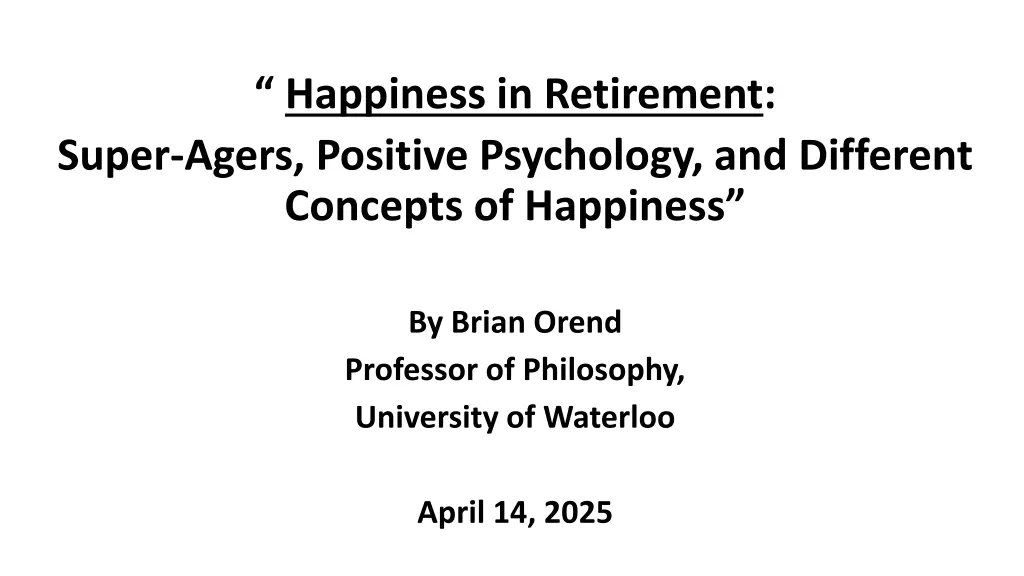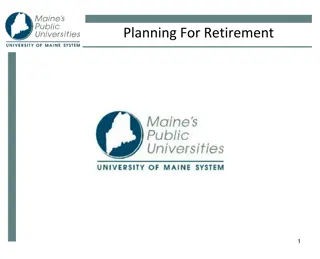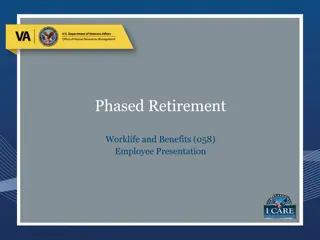
Understanding Happiness in Retirement: Insights from Philosophical Perspectives
Explore the concept of happiness in retirement through philosophical lenses, delving into ancient Greek perspectives and modern interpretations. Discover key factors for achieving happiness post-retirement, guided by prominent philosophical frameworks.
Download Presentation

Please find below an Image/Link to download the presentation.
The content on the website is provided AS IS for your information and personal use only. It may not be sold, licensed, or shared on other websites without obtaining consent from the author. If you encounter any issues during the download, it is possible that the publisher has removed the file from their server.
You are allowed to download the files provided on this website for personal or commercial use, subject to the condition that they are used lawfully. All files are the property of their respective owners.
The content on the website is provided AS IS for your information and personal use only. It may not be sold, licensed, or shared on other websites without obtaining consent from the author.
E N D
Presentation Transcript
Happiness in Retirement: Super-Agers, Positive Psychology, and Different Concepts of Happiness By Brian Orend Professor of Philosophy, University of Waterloo April 14, 2025
A bit about me -teaching at UW since 1998. PhD from Columbia University in NYC. I m a full professor, and the author of 8 books and the editor of 2 more. Most of my research deals with issues related to social justice, especially internationally. Human rights, and post-war reconstruction, are prime topics for me: e.g., my latest book is a 600-page anthology (groan!) titled War Ethics: Theory, Practice, and Memoir (Broadview, 2025 literally in a couple of weeks).
My connection to Happiness -sudden seizures, starting at 30. -misdiagnosis and medical negligence. -unhappiness, and so I researched happiness, and applied it to my life -ultimately, publishing a book called Seizure the Day: Happiness Despite Illness (Freehand, 2019) -now I teach an annual course on happiness at UW, indeed right now I m grading the final exams for my W term students
OK, so much for Intro stuff let s get into actual ideas! First, what are some concrete things that make you happy or give you pleasure, or you believe are part of human happiness? In particular, what you think is crucial to be happy in retirement?
Of course, our views about happiness will be crucial to how we understand happiness at any point in our lives, including in retirement. Want to canvass some basic, major alternative schools of thought about the nature of happiness before zero-ing in on happiness post-retirement.
Todays Agenda, contd -let s begin with 3 large-scale, old-school, deeply infuential philosophical templates about the nature of happiness, from ancient Greece: -as purely subjective personal pleasure (Epicurus). -as the achievement of an objective list of the ingredients for a fully-developed and flourishing human life (Aristotle). -as tranquility of mind and a calm acceptance of one s role in the world (Epictetus and The Stoics)
Free Primary Texts: http://classics.mit.edu/Browse/browse-Epicurus.html http://classics.mit.edu/Epicurus/princdoc.html
Epicurus on The Meaning of Life He thought that the universe is composed of nothing but atoms moving randomly through space: sometimes coming together for a time to form a thing or creature (like a human being), sometimes not. Shockingly modern. Epicurus believed that there is no intrinsic purpose or meaning, either to the universe as a whole or to human life in particular. The only thing we know for sure about human life is that we are creatures who like and pursue pleasure, and who dislike and try to avoid pain.
Contd Pleasure , Epicurus says, is the starting point and goal of living blessedly. And all good and bad consists in sense experience. Thus, pleasure is an enjoyable, positive sensory experience; and pain an un-enjoyable sensory experience. That is it: for pleasure, and for happiness. Happiness is actually identical to pleasure pleasure is the most we can hope for in terms of happiness; it truly IS what happiness means for creatures like us, mere material beings composed for a short time of physical atoms until they stop working, fall apart, and get flung back into the void.
But, its important to note that .Epicurus himself did not behave or advocate the way in which the word epicure has come to mean, which is to say: total hedonism, aggressive indulgence in all forms of YOLO decadent sensory delight.
rather, Epicurus thought . That such an aggressive approach was too risky, and that, to maximize a lifetime of pleasure, one should stick to risk-averse forms of low-level, rather pedestrian, pleasures on a daily basis: good food and drink, good night s sleep, socializing with friends and family, work that satisfies you, not worrying about death, engaging in pleasant leisure activities, savouring the five senses.
Now, few can deny that the best kind .. Of life needs to experience pleasure and subjective happiness, but criticisms of this view tends to be that: 1) It is too reductive and primitive an understanding of human nature and human potential: as Aristotle says, even mere pigs can feel pleasure 2) The problem of hedonic adaptation: we quickly adapt to what gives us pleasure, and each unit of consumption gives us less and less pleasure. How are we to reliably increase our happiness?
Contemporary Strategies to Lessen the negative impact which hedonic adaptation can have on pleasure and happiness: a) spread out the times and ways in which one experiences pleasure (e.g., space out those pieces of chocolate!); b) spread out one s sources of pleasure in general; c) cultivate a sense of personal identity which is itself plural, drawing on different strengths, sources of pleasure, value commitments, and habitual behaviours. This is the idea of The Complex Self , and such has been shown to be more resilient in general -- as those with more narrow, and rigidly defined, self- identities, can be subject to deep trauma if they experience large losses in one of those dimensions.
Objective Theories of Happiness -argue that there are universal truths, or perhaps a broadly shared framework, regarding human happiness (based on potent commonalities in the human condition ). These theorists then propose and defend what those essential elements of human happiness are, and Aristotle is a prime example of this.
Again full free works of his can be found at: http://classics.mit.edu E.g. the Nicomachean Ethics: http://classics.mit.edu/Aristotle/nicomachaen.html
For Aristotle - (and, in contrast with Epicurus), the universe itself IS indeed imbued with meaning and purpose; likewise, our lives are imbued by nature with meaning and purpose. This purpose for us is to become the best kind of creature, the most fully realized kind of creature, which we are (true *EXEMPLARS* of our species). Just like an acorn needs, and has an impulse, to grow into a beautiful tree, we too have a natural impulse to become the very best human being we can be.
Happiness, for Aristotle, has Three Parts 1) Pleasure 2) The External Goods 3) The Internal Goods
image HAPPINESS THE INTERNAL GOODS THE EXTERNAL GOODS PLEASURE
A term: Eudaimonia Eudaimonia translated most commonly as happiness but Ari s sense of happiness is much more robust and complex than mere warm feelings , or an excess of positive- over negative emotion , as we ve seen. More even than well- being . The implication is more like flourishing , thriving , being the best we can be.
For Aristotle, focussing only on sensory pleasure, as Epicurus does, is like giving up, and selling short the amazing potential of the species, and settling for pleasures that aren t very different from those of dogs and cats and monkeys. We re better than that, and should aim for more: not just pleasure, but the internal and external goods. What are they?
The Internal Goods are so defined in that they involve internal states of mind or consciousness: thinking, feeling and valueing, in particular. Essentially, this is about how you think, what your beliefs should be, how you feel and express the emotions, and of special concern for Aristotle was your moral values.
The External Goods -those things, outside of one s character and internal mental- and emotional life, which are essential for a happy and flourishing life: -good society and decent parents / upbringing -some financial security -physical health and safety -friendship, and good interpersonal relationships -even beauty
The external goods are all the same in that they are each necessary, but not sufficient, for happiness. You need some *baseline level* of income, health, physical security, decent society, and even attractiveness for you to become happy at all. But, once you have achieved that baseline, added amounts of income, health, etc., contribute very little to your happiness (this has been borne out in current researches, esp. with wealth and health).
Overall, Aristotle offers his 3-part account as a robust, complex, complete, satisfying, and inspiring picture of what it means to live a happy and flourishing human life: one filled with pleasure, one expressive of the internal goods (notably, rationality, appropriate emotionality, as well as moral excellence) and with the external goods as well (the necessary equipment of income, health, friends, a decent society). He d say: take that, Epicurus!
Objections to this view? -some object to the culture-bound biases of what Aristotle offers as an objective and universal account of happiness: he s projecting his preferences onto the world. -others say that, as impressive as this theory is, perhaps it is too demanding (unlike Epicurus simple recommendation of tending to your pleasures). It s almost like, for Arisotle, we have to have everything, or else we have nothing
Contemporary theories which mimic Aristotle s complex view, which blends subjective pleasure with objective measurements of well-being? There is such a thing called the World Happiness Report . They just released the 2025 report a few weeks ago Link: https://worldhappiness.report/
Using tons of data, the WHR concludes that about 75% of the variation in happiness levels across countries is explained by a mere six variables (meaning that the remaining 25% is caused by various factors within particular countries). These are: GDP/capita Life expectancy from birth In addition to such objective measures are the following subjective/blended measures: The perception that one has personal freedom to make the most important life choices (such as which career to have, whether/whom to marry, whether to have children) The perception that one has someone to count on for help and companionship The perception that one s society has low levels of corruption The perception that people in one s society are more or less generous and trust-worthy
The Top Ten, 2024, for the WHR: (in order) Finland, Denmark, Iceland, Sweden, Netherlands, Costa Rica, Norway, Israel, Luxembourg, Mexico. (Just missing out on Top Ten were Australia/NZ.) Canada? 18. USA? 24. CDA clearly falling over time; and this was USA s lowest-ever rating. And the bottom 10: Afghanistan; Sierra Leone; Lebanon; Malawi; Ziwbabwe; Botswana; Congo; Yemen; Comoros; Lesotho.
More on CDA -CDA s self-reported life satisfaction , those last 4 elements, the average score was 6.8 out of 10. See also: https://www.cbc.ca/news/canada/world-happiness-report-canada- 1.7488467#:~:text=Canada- ,Canada%20drops%20to%2018th%20in%202025%20World%20Happi ness%20Report%20rank,the%20annual%20report%20released%20Th ursday.
What about Epictetus and The Stoics? -they occupy perhaps the far extreme: whereas Epicurus had said that the universe has no meaning and equated happiness with sensory pleasure, The Stoics go in the opposite direction, and opine that the universe is filled with meaning indeed, is purposefully structured (agreeing with Ari) but that personal happiness isn t important at all. The only thing that matters is living a *meaningful* life, which involves finding your role within this purposeful universe, and cultivating an attitude of acceptance and mental tranquility about it.
His Enchiridion: http://classics.mit.edu/Epictetus/epicench.html
The universe is a purposeful whole, within which there is very little free will and individual control. We are puny cogs in a vast causal machine.
Stoics, contd. Their view of free will is that we are truly only free in terms of how we think and feel about things purely interior , subjective freedom and happiness consists in cultivating a resilient and enduring attitude of acceptance regarding what happens. Tranquility, and peace of mind: both the nature of happiness and the scope of personal freedom.
They then, as a philosophical school, kind of specialized in coming up with techniques of mental discipline, and emotional control, and passing those along to their adherents. Like, when someone insults you, and you want to be angry, how instead to look at it as a chance for self- improvement. Almost like the very earliest psychologists, or even comparable say to some Zen monks: about interior control, and detachment from external events, and the securing of peace of mind and a non-disturbed interior life. So important, as that s all you ve truly got.
Stoicism is enjoying a renaissance in the literature, inc very recents books like Nancy Sherman s Stoic Wisdom (OUP, 2021); and Tad Brennan s The Stoic Life (OUP, 2007). There s also the Daily Stoic website: https://dailystoic.com/
Some have said the rise -in the popularity of Stoicism has been in direct proportion to the rise in substantial, large-scale external world difficulties over past few years, regarding which we each have had so little control over, and just must deal with: the pandemic, the shutdowns, the soaring cost of living in general and of housing in particular, all the wars, climate change and related weather disasters, etc. The enormous appeal, against this backdrop, of a world-view focussed on achieving inner peace and mental tranquility.
Criticisms of this view? -some people have argued that this is a philosophy more about enduring pain and suffering, and less about the pursuit of happiness. (Yet, as all of us 50+ers can testify, pain management increasingly a real part of a decent life as one ages ) -others have argued that perhaps this will lead to passivity and complacency when, perhaps instead, we ought to be actively engaged with the world and trying to change it for the better.
Super-Aging there s been present-day psychological research into successful ageing. Many studies have confirmed that the following general behaviours tend to empower people to become successful agers: i.e., to live as long and as happily and as relatively disease-free as they probably can. Successful ageing is generally foreshadowed by: Not being a smoker (or, at the very least, having quit permanently by the age of 45) Not having a history of alcohol- or drug abuse
Super-Agers, contd Being of normal weight for one s age, height, and gender (and thus of NOT over-eating) Getting near-daily regular exercise Years of formal education are actually positively correlated with successful ageing. Regardless of one s formal education, staying mentally alive and active is crucial
Successful Agers, contd Being in a stable, satisfying cohabiting relationship, such as a marriage; -regardless of that, having as close and supportive and nurturing and active a social life as one can: lots of friends, acquaintances, loved ones, and just social group activities. and Having mature defence mechanisms and successful ways to resolve interpersonal conflict
Finally, theres a whole contemporary field of research known as positive psychology. These are people devoted to the research and studying of positive psychological characteristics, arguing that the history of psychology has been too obsessed with negative characteristics. What do the happiest people share in common? How did they get so happy and stay that way?
Top thinkers here include: Martin Seligman, Ed Diener, Chris Peterson, Tal Ben-Shahar, and Sonja Lyubomirsky. *If I would recommend one single book to you today, it would be Sonja s The How of Happiness.* It is fantastic, and a great read on top of all the high quality research.
What does Sonja say is crucial for happiness including in the retirement years? -having as healthy and active a body as is possible. -having as active and positive a social life as one can. -always having a goal or purpose to look forward to. And then, consider the following diagram:
Positive Emotion Negative Emotion
Over the course of 3 weeks keep a journal, and take note of the things which give you positive emotion, and those which give you negative emotion. Write it down, as the ink doesn t lie whereas mere memory is selective and has recency bias, etc. Then, analyze patterns -- and do more of what gives you positive emotion, and less of what gives you negative emotion.
And Try the Three Good Things daily ritual. At the end of every day, for 3 weeks straight, right before you go to bed, force yourself to recall 3 things which gave you pleasure or happiness that day. NOT the big things in life, as those are stable and you ll get bored of the exercises: small scale things unique to that day (e.g., taste of your morning coffee, a smile from a stranger). This has been shown, over people who did it for 6 months, to have the same boost in self-reported happiness as those trying a new course of anti-depressants.
And consider Tal Ben-Shahars MPS process. Ask yourself three questions: 1) What kind of activity do I find meaningful, and worth doing? 2) Which set of activities give me actual pleasure in the moment? 3) What kind of activity allows me to display skills and characteristics which I know are part of my own personal strengths?






















